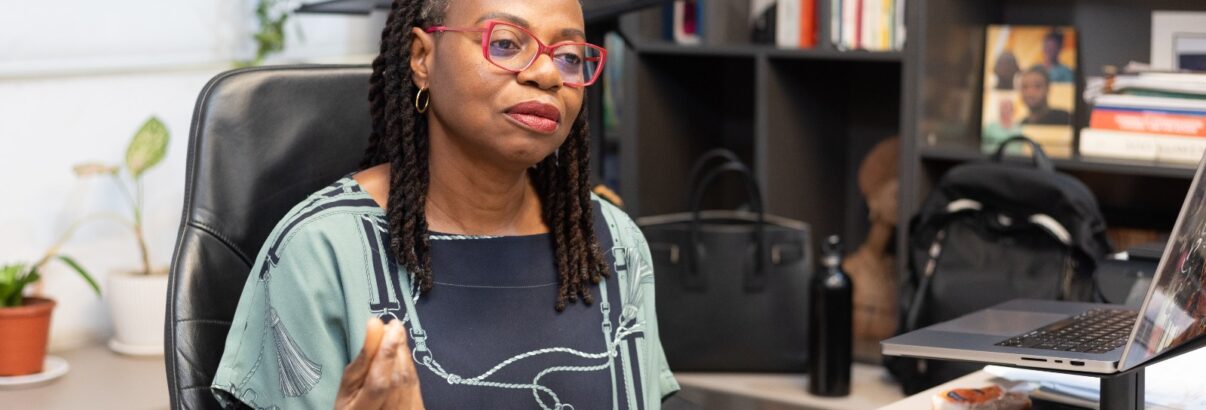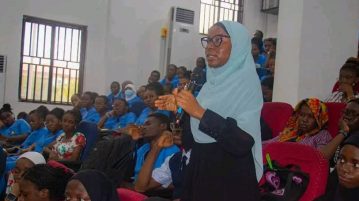As we gradually come to the end of the Women’s History Month, in line with the 2024 theme; this interview with Professor Bosede Afolabi – a renowned and globally recognised Women’s Health Specialist – highlights her role and the role of other women in advocating for equity, diversity and inclusion in mentorship, medical training, career in research and academia, as well as the healthcare space as whole.
Interview was conducted by the MWAN Lagos 2nd Edition Amazons In Medicine (AIM) Magazine Interview Team (Ibironke Sodeinde (DR), Dr Iruoma Osonwa, Dr Oluchi Kanma-Okafor, Deborah Ojo, Dr Ige Oyinda, Dr Enoch Oyegbade, Yetunde Johnson and Olamide). Edited by Mary Oluwakemisola Agoyi (Editor, MWAN Lagos AIM Magazine and Medical Mirror)
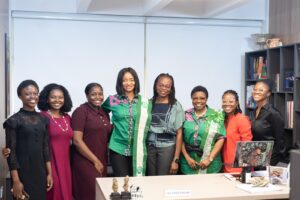
Q: What spurred your interest in Obstetrics and Gynaecology (O and G), specifically Maternal and Fetal Medicine?
R: My interest in Obstetrics and Gynaecology developed from a combination of how well I was trained in the subject in medical school, as well as my affinity and empathy for female patients. I remember that I felt a lot of sympathy for pregnant women, especially those who couldn’t afford care. I also felt very sad when we had young girls who had illegal abortions, developed complications and ended up in the hospital very ill. I felt bad about the stigma they faced because they happened to be female while their other partner in the problem was free of stigma. Apart from these, I was also fortunate to have dutiful lecturers and very hands-on teaching in Obstetrics and Gynaecology as a student and trainee. Hence, my interest in O and G developed as a combination of my empathy for women, excellent teaching, and a natural flair for the specialisation.
Q: Why did you decide to focus on sickle cell in pregnancy?
R: When I started working as a consultant obstetrician and gynaecologist, I also came into the College of Medicine as a lecturer. At the time, one of my mentors had done good quality research on pregnant women with sickle cell disease, and I was very interested in the high-quality research instead of just publishing for publishing’s sake. From the research, he (my mentor) had found for the first time that their plasma volume did not expand during pregnancy, and we know that plasma volume expansion during pregnancy correlates very well with the outcome of pregnancy. Pregnancy usually goes well when you expand your plasma volume, but this was deficient in pregnant women with sickle cell disease.
This brought about some questions – like in every good research – which normally are meant to be answered at the end of the research. So, I decided that I was going to carry on with the research, to answer these posed questions. Apart from this, there’s also the fact that pregnant women with sickle cell disease have a lot of challenges apart from their immediate clinical challenges, especially for those that attend hospitals. They have a lot of financial challenges as well, hence they need extra care and attention. I have always felt drawn to such situations, so I thought, “this is an area to go into”.
Q: Interesting. So, was it more of leveraging on available opportunities or leaning into your own existing interest? Or did they just align that way?
R: I wouldn’t see it as “opportunities”, rather, I saw high-quality research questions that were and still need to be attended to. Then in the process of getting that done, we realized that this is an area that required a lot of extra work as well. Moreover, I wanted to be able to make the lives of women who had this condition better.
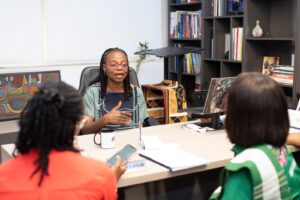
Q: Did you aspire to be a professor, or did you find yourself in this role?
R: I indeed had a desire to become a professor, but my path took an interesting turn when I discovered my passion for research. Let me share my journey with you. When you begin clinical practice, as many will during housemanship, it’s undoubtedly demanding. You’re at the bottom of the hierarchy, responsible for various tasks that may not align with your initial expectations as a doctor. As time went on, even after completing medical school, I found myself appreciating my medical education, particularly at the University of Ife. Unlike some who solely focused on their studies, I always sought to explore beyond the curriculum. I enjoyed attending philosophy lectures and engaging in various activities like hill climbing and watching plays. Ife was a unique experience compared to Lagos, where you might miss out on such opportunities.
We believed that we, the young students, were the ones who could contribute to making Nigeria better. Apart from pursuing medicine, I planned to specialize in Obstetrics and Gynecology (O&G) immediately after medical school. The quickest path was to head to the UK for specialization. I spent approximately four and a half years there, gaining expertise, and eventually returned to Nigeria immediately after qualifying as a gynaecologist as a Member of the Royal College of Obstetricians and Gynaecologists (MRCOG).
I vividly remember being one of the youngest lecturers, here at this institution. Typically, specialists enter in their mid-thirties, but I was about twenty-eight when I began.
Working in the UK was not without its challenges. Starting as a senior house officer (SHO), I handled night calls and faced the demanding nature of clinical work. It was during this time that something in me sparked when I opened the British Journal of O&G. I realised the value of research in contributing to medical knowledge, and I became enthusiastic about it. After completing my membership, I decided to return to Nigeria as planned, to engage in teaching at the university and teaching hospital. Becoming a professor became my aspiration, not merely a coincidence. Upon my return, I began applying to join the College of Medicine, and within a year, I was accepted. This was all about twenty-four years ago.
Q: Wow! From where you left off, it’s been quite a journey. Do you have any regrets about your path up to this point?
R: No way! Although there were times, especially at the beginning, and strangely enough maybe about ten years ago. But the ten years ago scenario wasn’t regrets, it was just sheer frustration. However, I’ll start from the beginning; the beginning part because I got back, had my qualifications from the UK and I was getting a lot of push back in getting the qualifications here. I was being told things like I have to start from the beginning; how can I have MRCOG and still go back to do preliminary exams again to gain qualification?
Fortunately, I managed to get hold of their laws that show that my MRCOG is equivalent to part one. So, all I had to do was part two for both colleges. I spent an extra two years working on that because one of the colleges needed me to also do some time as a senior registrar. Due to my qualifications, I didn’t come in at the same level as my peers, my peers came in as lecturer 1, and I came in as lecturer 2. So, I had to go from lecturer 2 to 1, and yes, it did take some time to get promoted, but I did it.
Also, being the youngest and being female, you know, it wasn’t really easy. I kept getting comments like “you have to do a lot of the heavy lifting and the extra work” and so on. Those challenges were quite frustrating, but as time went on, I got my head down and just started doing my work.
Another time when it was difficult was when I decided to do my Doctor of Medicine (DM) – or MD as you call it. That’s like having a Ph.D. in Medicine – and I registered for it at the University of Nottingham as a split site student, and at the same time I was doing my regular work here in Nigeria. So, I was using just my leave period to go for it. Since it was more of research, I was doing the work here on sickle cell and then going there to learn laboratory work, take the necessary lectures and course work. This shuttling took quite a while and it was tough. Plus, I didn’t have anybody holding my hand alongside it. But at the end of the day, it was a very good decision, because that was what lifted me in my career and made my work get to a large audience. So, NO REGRETS! But Frustration? Yes, at times.
Q: Really Insightful, thank you for sharing ma. Looking at the opportunities that have come your way as a result of your hard work over these years, how do you think we as young individuals can position ourselves for opportunities? What can we start doing even as medical students and young professionals?
As young professionals, if you’re interested in certain areas – be it research, advocacy, health systems work, policy or whatever – you have to start looking for people doing it or working in those areas and start volunteering to work with them. One of the issues with people in the younger generation is that they are about instant gratification – work today to “blow” tomorrow. A lot of you watch all those Instagram and other social media videos and feel or think that’s how the real world should be. You need to be ready to put in the work, it’s very important and this is one of the many things to start with.
Two, as females – unfortunately – we’ve been conditioned to feel that we have to do everything. We assume or think that it’s the same you that must do everything at home, at work, in the society and we tend to forget that we are humans and at the end of the day, it’s not possible to do it all. I learnt this very early; there are certain things I just don’t do. I delegate anything that can be delegated, and it makes life easier for me. It doesn’t mean that I’m not busy, in contrast I’m still extremely busy. But at least “I’m not the one blowing fire in the kitchen as well” – I have people that help me.
I remember when I first got back, I thought, how can I have a driver? Largely because I’ve always had certain ideologies in terms of “we’re all equal” and “we shouldn’t have people do certain things”. But I quickly realise that assistance was needed as I could not do everything by myself. Now, what I do is go the extra mile to make sure that I remunerate better than the average person, so that the people who work for me know that they’re appreciated, and they also want to keep working. Due to this, I tend to keep my domestic staff for long periods; most of my domestic staff have been with me for ten years or more, because we’re all human beings and should be treated as such.
Another thing is, if you decide to have a spouse – which most women want to – try and ensure that you choose somebody who will understand that “it takes two to make things work”, “everyone has their roles” and “this is what you would like to have and want your future to look like”. Make sure your future (plans) converge as much as possible. This is very important.
Q: Thank you for the tips ma. Do you have a favourite relaxation hobby or holiday destination?
R: I can tell you the place I’ve been to and enjoyed my stay there – The Maldives. It’s very rich in relaxation and touristy things. Also, I find that it is important to balance your life – in terms of doing other things – and one of the things that keeps me going is exercising. I exercise a lot – I swim, I go to the gym, I walk and do strength training at least four to five times a week.
Aside from this, I also meditate, because meditation is a very big way of relaxing for me. It’s about being aware of the present moment- as much as possible – every time, and not getting lost in thoughts of the future or the past. Because those thoughts drain you and make you feel more stressed than you should be. Nigeria and Lagos have enough stress already, so you have to find ways to relax by meditating or doing things you like to do.
So, if I tell you that I’m very busy, part of my busy time is also spent for myself to relax. For instance, during the long holiday, someone I respect a lot asked me to please help take charge of some young women being mentored on a particular day, and it was impromptu. Even though it was difficult, I had to say, “I was sorry, but that day was rest day for me” and I needed to take it as such. Also, I didn’t tell her that I was doing something else, because I wasn’t doing anything else. I just decided that I was going to rest and that is very important for my wellbeing as well.
When you get to a particular level, you will be surprised at how difficult it gets to take a rest, because everybody wants you to do something. Daily, I get nothing less than 20 emails asking me to do one thing or the other, apart from other personal and spam emails. They are so many, it is almost hard to keep track. So, in the midst of this your passion and calling, you have to intentionally find a way to have your rest time and
relaxation. This is also part of how you remain relevant in your field. So, we have to learn to say “NO” as much as possible.
Q: One more favourite thing; what’s your favourite colour?
R: It’s red.
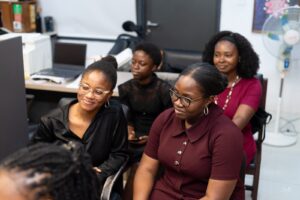
Q: Let’s talk your hair and skin – which always looks amazing by the way. What are your tips for having a peng skin and peng hair like yours? or is it more genetics?
R: Laughing out loud, thank you. Make sure you wash your face twice a day using good-quality moisturisers as much as you can afford to. As for the hair, I have locs (dreadlocks) and locs are great for your hair – as it helps to grow the hair naturally. It took me quite a while before I started my locs even though it I have always loved locs. My inspiration for locs was from seeing Alice Walker – an African American author whose work I really like (she wrote The Colour Purple and Everything we love can be saved)– on TV on several occasions and on the cover of her books. I thought she had the most glorious-looking locs I had ever seen, and I also liked the idea of having natural hair instead of continuing to “perm” my hair. Although, I kept wanting to do it as far back as 2008, I thought as a doctor, “how can you have dreadlocks on?”. Finally, when I became an associate professor, I said, “okay, I think I’m senior enough to be able to just start”. So, I decided to loc my hair and never tried to cover or hide it. If you go to my Instagram account, you will see how my hair was, and the good thing is that – it doesn’t break, it stays. Since I started, I have only cut it once, that was about 3 years ago when I cut it in half. Because I thought it was too long and might have issues packing it. But now, I’m not going to cut it again, I’m just going to let it keep growing and see where it tends to get to.
Q: Being in the medical profession with a lot of “illiteracy” or “limitation” within the system, where sometimes it’s not up to you or you are told that you can’t do certain things until you get to certain levels in the profession or made aware that you just have to follow the system; how were you able to navigate this establishments?
R: It’s actually a tough one, because one doesn’t have control over the system. Albeit, one important thing is to keep pushing. For instance, there was a time I was eligible to be promoted to associate professor but the head of the department then, felt I wasn’t ready because I was too young. Even though – fairly enough – I still rose faster than others, I would have been faster if certain things had worked out. But the good thing nowadays is, once your papers are complete, the rules are there and you will be promoted. Likewise, one thing to do is not to keep quiet. It’s important to know the rules, write about it to and through your head of department to the authorities and keep pushing. When you are supposed to be promoted, go to the right people or offices and talk to them – do not be afraid.
Fear tends to put us, especially women, down because we feel afraid of being seen as an aggressive person or a troublemaker, but take your stand always and don’t be afraid!
Put down fear as much as you can, it’s easy to say, but also possible to do. There have been times I was really afraid, particularly about 10 years ago when I had a bully as the head of department and was being frustrated – I had never been bullied in my life. Even though I was already an associate professor in my forties, at that level of my life, I was still being bullied. Then, I would come to work with palpitations and be afraid of what was going to happen next. I would wonder if this man was going to make me feel less of a human again, and think if it was going to be the last time? However, what was important was that, even though I was really afraid and traumatised, at some point, I just stopped receding into the wall and pushed back. With the knowledge that “what doesn’t kill you, makes you stronger” – he wasn’t going to kill me anyway.
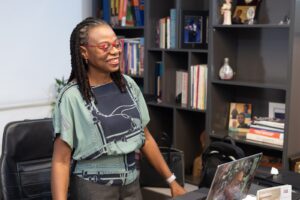
At the end of the day, you will have sleepless nights, you will be afraid when you’ve done it. But when the reward comes, you will be happy you did it and feel better as a person – especially when you’re speaking the truth. Once you know the rules, it sometimes even helps the management to see the rules. You can be the one to write about or draw attention to a situation that is not right and shouldn’t be. Luckily, the University currently has a Vice Chancellor (and Management) who is attentive to things that have to be worked on, and initiates them. In the ideal sense of things, there shouldn’t be any case where one is qualified for something but some people are saying there’s no space, when in fact, there is – it just doesn’t make sense. So yes, my advice is – always ensure you stand up for yourself, and push back.
Q: What is you take on the current “japa” and “japada” syndrome riddling our nation?
R: Hmmm, I understand the premise behind it – It’s tough in Nigeria, whether you’re old or young, whether you’re even successful or not, it’s still tough. Especially when you feel unappreciated and you know there’s nothing you can do to help. However, I’m constantly appealing to my students. In fact, for this reason, in one of my lectures, half of it talks about career choices, because I still strongly believe that we’re the only ones who can make a difference in our country. Nobody is going to come and do it for us, and if we all go away, it’s not going to get better, it’s only just going to get worse.
It’s convenient to say, “when I go away I can get funds to help here”, yes fine, but it’s not the same as putting in the work and helping out here – to make things work. Because the more people who have ideas, integrity and plans, leave the country, the more we are left at the mercy of people without these attributes. Also, it’s important to note that Nigeria trained her doctors for “chicken change”, way less in comparison to the average cost in developed countries. Yet, we leave to “help” these economies that are already made, neglecting ours.
For instance, I was told that in England, they made the decision that they couldn’t train more than a certain number of doctors because it cost them too much. So instead, they decide to recruit the ones already trained at subsidised rates to run their system and if this is true, it is quite sad. Personally, I feel we all – especially the middleclass people – have a lot to do in making our country better, because we know better. But we leave it and can’t be bothered to get involved with the aim to make a difference, because it’s too much hard work and it keeps getting worse. Forgetting that the only way it can get better is if we get involved. I do understand if you say you want to go and see how things are being done out there – even I did it. I went away to come back, but I always had that as a plan and luckily, I was able to carry out the plan, especially because I wanted to specialise quickly.
Regardless, I believe specialisation or not, you can still do it here or there to return, and this aids in having “the best of both worlds”. Because as doctors, we will always have that opportunity to travel and do whatever we want to do.
You know, recently I was talking to one of my colleagues and said, “I strongly doubt if I would have been able to get an audience with Bill Gates if I were abroad or be able to get the kind of opportunities that I have if I was based abroad”. Because there are hundreds of millions of people like us there with opportunities provided to them by their society. For us, this is where we can get that make the difference and get that kind of recognition. So, it’s important to be very strategic about your future and tie it to the Nigerian future. Because when you go abroad, you will always be a second-class citizen – you cannot be number one because you’re just not from there. But you can be respected here and internationally, if you make a name for yourself here, I mean, that’s just the way it is. I think we all need to look more into this and realize that Nigeria is the only place we have.
You can have the best of both worlds if you stay here and you can always go out, but if you must go, come back quickly.
Q: Mentioning Bill Gates, we saw your picture with him on social media. What was that about? Would you mind giving us an insight into your meeting with him?
R: So, I get a lot of grants for clinical trials and the first BIG grant I got was actually by a Nigerian organisation – the TETfund Nigerian grant. Sometimes, these things are available and attainable but we don’t get them, because we don’t apply for them. For example, the TETfund grant is for all Nigerian universities, so when they call for grant application, I applied to carry out the clinical trials for my sickle cell research with my team. And after several processes, we got it – out of thousands of applications. Many other people got it as well, about fourteen from the University of Lagos between 2019/2020. When we got the grant, it was quite big, summing up to #38,000,000 (approximately 110,000 USD at the time) to do a clinical trial. Knowing that clinical trials are very expensive when you want to do them well, that was actually quite small. Anyway, we got the grant and we started work with it.
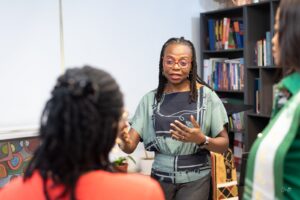
As time went on, in the process of mentoring, I had a mentee who I supervised his project on iron deficiency anaemia in pregnancy, and was an author on the published paper. After which an opportunity came through his classmates’ network, as a connection to someone – named Aisha Kasali – working at the Gates Foundation at the time in 2020. At the unit she was in then, they were looking for people that could work on clinical trials for iron deficiency anaemia in Nigeria or Africa. And since my mentee (who is now a consultant as well) and I had published a paper on the subject matter, he reached out to me, and that was how we got the team on board. Later, I got connected to the Bill Gates team, this was obviously after thorough background checks had been done, and that’s how the link came about. So, it was quite a connection across peers and colleagues. Subsequently, I was asked to submit a proposal. The first concept note for the clinical trial submitted in February 2020 (just before the full COVID outbreak) took us about four months to put together and I was told there was no guarantee it would be accepted. Albeit, by June, I was told to submit a full proposal. Then I thought to myself, “I don’t just want to carry out a clinical trial, but wanted to do implementation science”. Because I had gone for a conference earlier, where someone talked about “implementation science” and I found it interesting.
According to the presenter, Implementation science is bridging the “know-do gap”. Meaning, when you have the evidence from a research work, how do you ensure that it gets used? Most of the time, we get the evidence and it doesn’t get used. So, I looked for this science, we packaged it, sent it to them, and it was funded. Hence, we got our first international Grant – summing up to $2.5m USD– to carry out the clinical trial on intravenous versus oral Iron in pregnant women i.e. IVON Trial. Since then, we’ve gotten one for postpartum women (IVON postpartum), another one just for the implementation science (IVON IS), and then we have IVON PP – these three different projects are all funded.
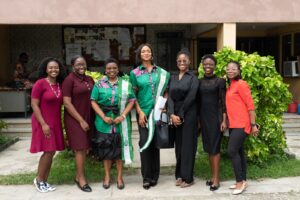
On all that noise by the media – putting my face all over town for kidnappers (laughs) – I made sure after that, I would never put it out there anymore. I had to tell the university that, even though I know you want to brag, please keep me out of it – for safety purposes. So, the external funding for which I was Principal Investigator started with Gates’, (I had other funding from the NIH as part of a team before that) plus I think they found that we’re doing good work as well, hence, there is definitely more to come.
When Bill Gates came to Nigeria, he spent 90 minutes with me and my team. We met at one of our sites –Randle Mother and Child Centre – showed him our Intravenous iron being given to a Postpartum woman. After that, we came down with him to the College of Medicine, and took him to the CCTRIS lab – the centre developed for these clinical trials – and the data center as well, answering all his rapid-fire questions as we went from place to place. Right from there, we walked down to my office, with two of his senior members seated in with us, during which we spent about 30 minutes discussing, asking and answering questions. After this, we went over to the HOD’s office (because there was more room there) to shoot a short documentary and have an interview session with him. Then, the VC, Provost and CMD came in to meet and take a photograph with him and after that we shook hands and he left. So, that was how I spent my 90 minutes with Bill Gates.
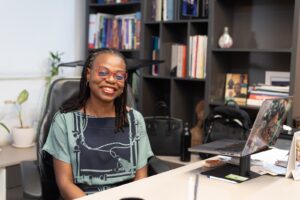
About Professor Bosede Afolabi:
Prof. Bosede Afolabi is an accomplished Obstetrician and Gynaecologist, who currently heads the Department of Obstetrics and Gynaecology at the College of Medicine, University of Lagos, and the Lagos University Teaching Hospital, Nigeria. She is the Director of the Centre for Clinical Trials, Research and Implementation Science (CCTRIS), at the University of Lagos and the founder and chairperson of MRH (Maternal and Reproductive Health) Research Collective, a research and training NGO. She is also the President of the Association of Fetomaternal Medicine of Nigeria (AFEMSON). In 2021, She was awarded a Special Recognition Award by the Physician of The Year Award Committee for her Commitment and Dedication to healthcare in Nigeria. Also, in 2022, she received the “Excellence in Research” award from the Society of Obstetricians and Gynaecologists of Nigeria (SOGON), and was the Ojo Memorial Lecturer at the same SOGON conference. Passionate about the advancement of women’s health and reduction of maternal mortality in Nigeria, her clinical and research interests lie in maternal medicine, including sickle cell pregnancy and anaemia in pregnancy. She also has clinical expertise in pregnancy-induced hypertension, cardiac and autoimmune disease in pregnancy, minimal access surgery; general gynaecology, including infertility, endometriosis, uterine fibroids and polycystic ovarian syndrome.

